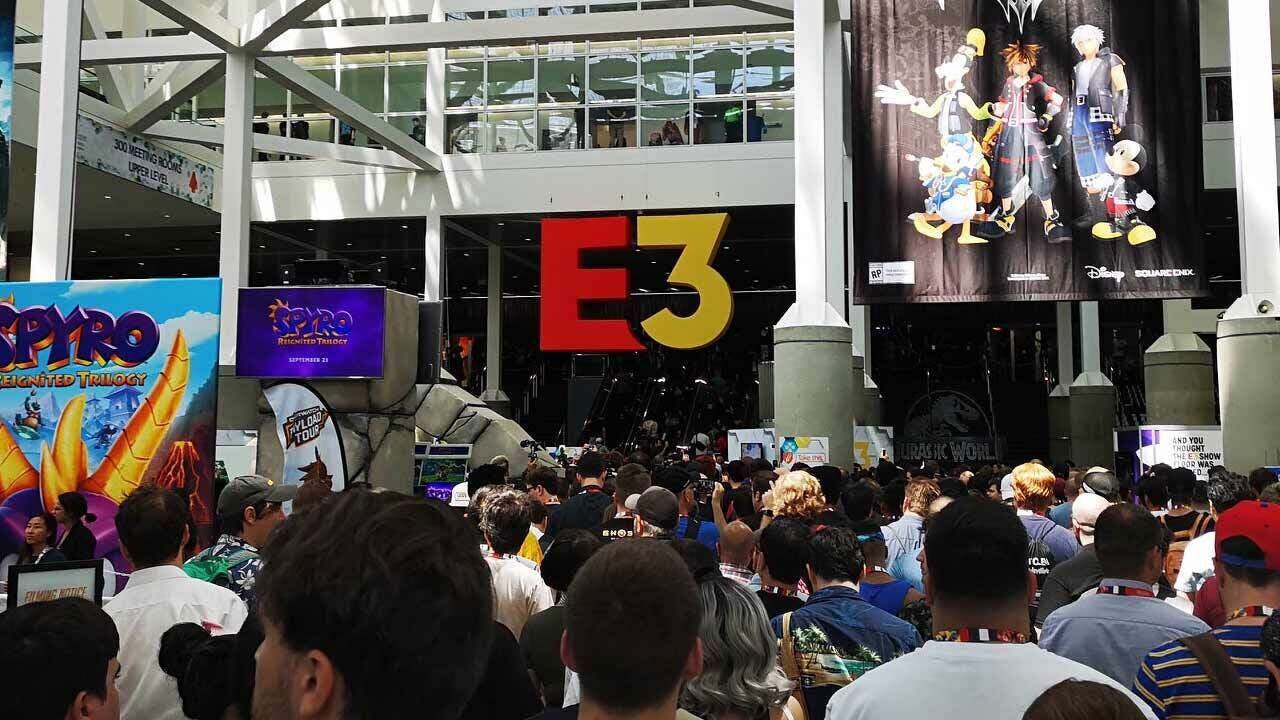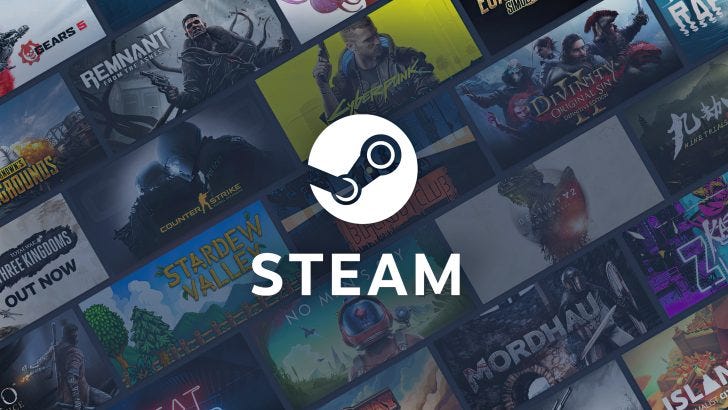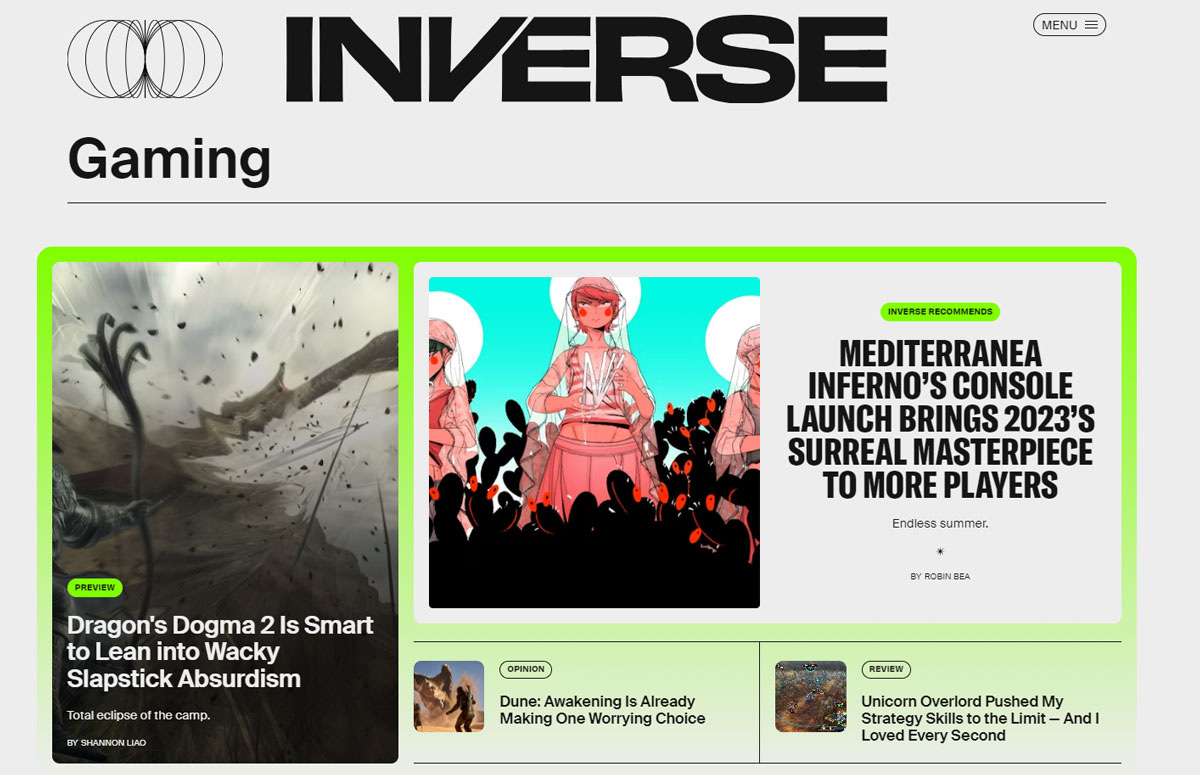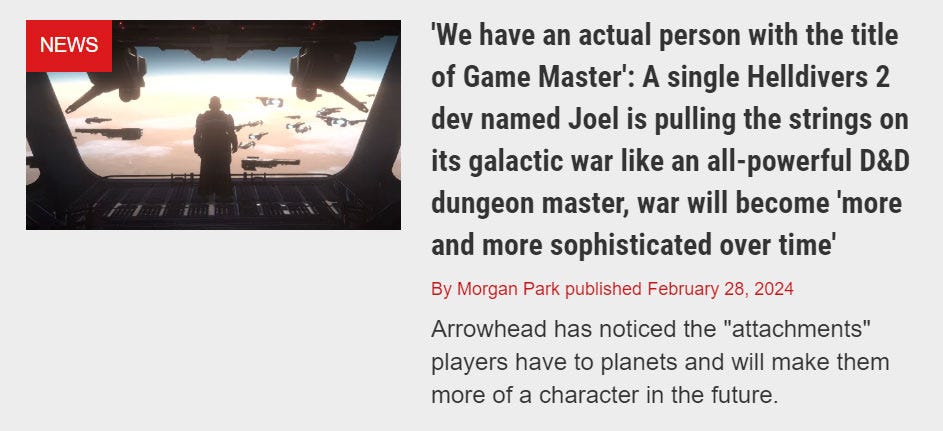The Many Deaths and Enduring Power of Games Media
push to talk #10 // feat. an essay about the past and future of games journalism

A decade ago, I left a career in games journalism. After achieving my dream of writing for print magazines like GamePro, PC Gamer, and EDGE, it all fell apart.
That’s the funny thing about games media—it’s always dying, and somehow it always endures in some form or another.
So, in a fun role reversal, this week I interviewed some games journalists and a PR pro about the current state of games media. The resulting piece is a weird mishmash of personal essay and a reported deep dive. I hope you enjoy it.
That’s below. But first up, this week’s spiciest news links.
Scuttlebutt and Slackery
The week’s most-shared, oft-Slacked, and spiciest games industry news links.
Steam Sets New Record with Over 34 Million Concurrent Users - Isn’t it kind of strange that Valve just completely won the “console” war without ever shipping a box? Every other week this year there’s been some multi-million-selling hit on Steam with huge backing from console publishers. Palworld has Microsoft and Game Pass. Helldivers 2 has Sony. But both of them have more players on Steam than on consoles. PC used to be “that other games platform.” Now it’s the games platform. (Eurogamer)
Tim Apple Vs. Tim Sweeney Continues - It’d be impossible to summarize the whole Epic vs. Apple story here, so I’m not gonna try. But this week the saga continued when Apple deleted one of Epic’s developer accounts seemingly in retaliation for, in part, tweets by Epic CEO Tim Sweeney. After some EU leaders made disgruntled noises, Apple backed off and restored the account. I’m team Sweeney on this one. (TechCrunch and Epic Games)
Balatro Flies Too Close to the Sun, Gets Temp Banned - Balatro, a highly addictive Poker-inspired roguelite by solo developer LocalThunk, has sold over half a million copies. This is despite the fact it was suddenly pulled from sale in several countries thanks to a decision by the EU games ratings board, PEGI, to classify the game as 18+ due to “encouraging gambling.” Thankfully, it seems, reason has since prevailed. Earlier today the game was put back on sale almost everywhere. In the midst of all this, one game reviewer at Inverse made an elegant argument in favor of Balatro that I think is worth a read. (Inverse)
EA is Selling Classic DOS Games on Steam for $2 Each - I don’t know who approved this, or why, but it absolutely rules. You can get now get PC classics like Sid Meier’s Alpha Centuari, Sim City 3000 Unlimited, Dungeon Keeper 2, three Populous titles, and 17 (!) Command & Conquer games for $2.00 each. That C&C collection is available for $9.88 as a bundle. (Steam)
The Many Deaths and Enduring Power of Games Media

About a decade ago, I "jumped the fence" from games media to game dev.
From the age of 15 through the end of my college years, I somehow managed to get paid actual money by writing about games on the internet. It started with a personal blog, which gave me clips I could use to convince bigger blogs to let me write for them. By age 16, I had a gig that paid $25 per article, twice a week. A few years later, my first print article was published in the January 2011 edition of GamePro magazine, and from there I was really hooked.
I started to think I could make a career out of this games journalism thing.
By 2014 I was a regular writer for WIRED, where I got to write long feature stories and interview developers like the creator of Flappy Bird or the infamous Peter Molyneux. I loved that job. As a kid who grew up loving games, there was almost nothing better than getting paid to talk to game devs and write about their work.
And more than that, it felt like writing about games mattered. I could make a difference by shining a light on small indie devs that deserved more attention, or by calling out exploitative games.
But as I got closer to graduating from college (Ole Miss class of 2014, lemme see those Hotty Toddys in the chat) it was increasingly obvious that the media business was in rough shape. Print magazines were all dying out, freelance budgets were drying up, and nobody was hiring for staff roles. I screwed up some story pitches with WIRED and my other regular patron, EDGE Magazine (everybody had caps-lock on back then) and all of the sudden I wasn't getting paid to write on the internet anymore.
I decided to take a risk and move to Los Angeles to work for a games industry events company. From the moment I touched down on the west coast I started hustling, trying to make the journalism gig work out by pitching stories and sending out feelers about potential full-time roles at local media companies. I even interviewed in person at Buzzfeed's LA office, an experience so soul-crushing that I stopped the job interview halfway and fled the building.
And then, in 2015, the miraculous happened—I landed a job with Riot Games as a mid-level copywriter. At Riot, nobody cared about the work I'd done before. The League of Legends marketing team basically ignored the traditional games media, and the games media ignored Riot Games.
Instead, Riot talked to players directly through the boards, the LoL subreddit, and through blog posts and patch notes posted in something like 16 officially supported languages on the game's official website. I remember the first time somebody showed me the web traffic analytics for individual LeagueofLegends.com posts. It was 10x higher than anything I'd ever seen before, including my best-performing posts for WIRED.
The more I drank the Riot kool-aid, the more I started to think: maybe games media doesn't matter as much as I thought? It was a widely-shared attitude at the company that was absolutely shattered three years later, when Kotaku's Cecilia D'Anastasio published a blockbuster exposé about a history of sexist incidents at Riot stretching back to the company’s early days. Suddenly, traditional PR mattered a lot—but mostly in the context of what you might call "corporate affairs." That is: lawsuits, settlements, firings, that sort of thing.
A lot changed that year and in the years following. By the time I left Riot in late 2020, you'd regularly hear people talking about the company's history in terms of two definitively different eras: pre-Kotaku and post-Kotaku.
But throughout the turmoil, those of us in "Building D"—the enormous open-plan workspace where the League of Legends team sat—kept shipping patches and talking to players through our own channels. Boards, Reddit, Blogs, Twitter, Discord.
Games media wasn't a part of the equation, not because of the ongoing controversy, but because we felt like we didn't need anyone's help to reach our players.
The State of Games Media and Developer Comms
That was the mid-to-late 2010s. Let's fast forward to 2024.
While many games industry studios are cutting staff, the cuts (so far) have tended to be within the range of 10%-20% of global workforces. These are enormous numbers—the biggest downturn since the 2008 financial crash, but they look almost rosy compared to what's happening to the online media ecosystem, where entire businesses are closing shop for good.
VICE is dead, Warner Bros. just killed Rooster Teeth, and last year the Washington Post laid off almost all their games reporters. Basically every games media website has had layoffs or outright closures in recent years, and there's no reason to think the trend will reverse.
The only bright spot for games media has been a few examples of reporters starting their own subscription-driven businesses: Aftermath and Game File being two standout examples.
So it’s mostly bad news for the people that produce games media. And if you're a game developer looking at the situation, and you’re thinking about reaching out to games media in the hopes of promoting your game, a couple of facts jump out:
Traditional press is becoming less critical for games discovery as most players now find out about games on social and from content creators, particularly on YouTube
PR is also no longer the main way for devs to communicate to players—owned social channels fulfill this function much better.
In other words, there is a fundamental shift that has happened in game dev comms.
Because everybody now has a voice and a channel of their own on the internet, your reputation is determined by what lots of people say about you, not what a few big traditional media channels say about you.
This democratization and decentralization of comms naturally leads anyone making things online to re-assess how they communicate with their audience. And the comms strategy that many developers and marketing people have independently landed on is one I call arming your advocates.
The idea is this: you use your own channel (whether it's an X account, or your email list, or your Steam updates page, or whatever) to give people good, true information, and in doing so you arm them to advocate on your behalf—then they’ll do the job of spreading your message for you.
This can work for you and against you, depending on whether or not you know how to use it. If somebody makes an outrageous claim about you and you stay silent, your advocates will stay silent too, and less generous people—who might assume the worst about you—will speak up and determine the narrative instead.
All these factors sort of stacked up on top of each other over the last few years to drive a massive shift in the way game developers talk to players. Everybody is investing in their own social channels, announcing games using their own Nintendo Direct-style livestreamed events, and even publishing their bad news using cute thematic image templates on Twitter. All owned, no earned.
Games Media’s Value in a Social Media Age
So, from a game developer perspective, a natural question arises: how should games media fit into the equation? Maybe more bluntly, what's the value proposition?
I reached out to Shannon Liao to get her take. Liao is head of gaming at Inverse, and has written about games for mainstream outlets like The Washington Post, The Verge, and CNN. She readily acknowledges that developer-owned social channels are now the predominant way for game studios to get the word out about their games. But, Liao points out, journalists offer readers and devs the chance to explore perspectives on games that wouldn’t fit in the marketing materials that go out through official channels.
"Many games journalists are gamers first, and they'll write about their enjoyment of a game, the features that puzzle them, the questions that haunt them,” Liao says. “That introduces a degree of freshness to the kinds of stories they can tell about video games."
Liao argues that journalists are able to talk about aspects of games that otherwise might go undiscussed. "Video essays, well-crafted articles and deep dives can shed light on what can be a nebulous and opaque development process," says Liao. "Sometimes developer-focused social media posts can get in the weeds, like patch notes or dev blogs, so it's great to get industry trend pieces and big picture stories about where it's all headed."
And, Liao says, there's value for both players and the games industry as a whole when journalists are able to dive into stories that game studios aren't eager to broadcast. "This can humanize the creators of these games, and make the entire thing even more transparent."
Sidebar: The Need for More Access
Greg Burke, head of video at Shacknews, points out that games media is quickly becoming one of the only non-paid ways to reach players outside of your own channels. "A big difference between us and influencers is you don't pay us to cover your game," Burke says. "The most popular influencers are gonna want money to talk about your game. I have 45 meetings scheduled at GDC, and not one of those people are paying me. I think that's so important."
Burke has mixed feelings about the state of the games journalism business. "It's tough,” he says. “Getting people to click links and read is tougher than ever in 2024."
Plus, says Burke, many storytelling opportunities are limited because developers don't want to talk to press anymore. "Our access to developers has been—not cut off—but scaled back," Burke says. "The days of interviewing a dev on, say, Starfield, are just about over. We rarely get those offers anymore. We ask, and they usually say 'no thanks' or don't respond."
Burke says that access to more developers across a wider variety of roles would be helpful for helping players understand how much effort goes into making their favorite games. "It seems like the game directors get all the press. But what if we could cover more of the roles? And then we could help communicate how complicated games are."
Jennifer Acree, CEO and founder of the PR agency JSA+Partners, says devs are leaving value on the table if they aren’t proactively working with media. Having a good media relations strategy, she argues, lets developers "establish credibility, disseminate more substantial messages, and reach a targeted audience."
Acree points to the recent interview that Helldivers 2's lead did with PC Gamer as a great example of what you can get when you work with media to tell a story. "By introducing the semi-faceless dev controlling the flow of the game," says Acree, "they are not just humanizing the developers behind these games, but also rallying players against a common in-game enemy—the secret galactic mastermind Joel. It’s a textbook case study in strategic PR and storytelling that doesn’t just drive coverage, but meaningful conversations and community engagement."
Acree's argument really rings true for me. If you look at the way news and conversation flow together on social media, a big chunk of it could be summarized as reactions to headlines. Not, mind you, reactions to article content. But headlines, short snippets, a key message or quote—these are small enough to feed into viral content machines and get traction on X, Reddit, Insta, and all the rest.
Journalists understand this intuitively, which is why you've started to see more and more outlets abandoning old-school SEO principles by putting entire article summaries into their headlines. They know that's the only way most people will ever interact with the work. The aforementioned PC Gamer piece about Helldivers 2 is the perfect example of this phenomenon in action.
I know a lot of game developers who assume that, thanks to the rise of influencers and social media, pro media's place in the equation is diminished or negligible. If everybody now has a voice, who cares what one writer with a website thinks?
At points in the past, I’ve been sympathetic toward this view, but as time goes on I'm starting to think it misses something important. The fact is, on the internet as it exists in the 2020s most conversation occurs around headlines and in reaction to those headlines. And journalists are the ones producing the work that the headlines ultimately derive from.
The point is this: Although it’s true that traditional media has lost some of its importance for things like getting your game discovered, it’s actually still critical to the way games discussions happen online in a way that isn't appreciated by most players or developers.
If you're a game dev and you want to arm your advocates with a particular message or a catchy story about your game, then yes, you can and should be telling that story using your own channels. But you're almost certainly missing out on real upside when you limit the discussion to reactions to your marketing materials.
Some of the more savvy marketing teams in gaming have already started to pick up on this and are investing in PR. Riot Games, which almost never spoke with games media in the 2010s, now has some of the best PR reps in gaming, and they’ve gotten really smart about working with journalists to tell stories that wouldn’t make sense coming from official channels.
If you're able to tolerate the perceived risks, and you believe in your team and the games you're making, it's worth working with media. I know there’s a lot of fear around opening up to reporters, but the vast majority of people who write about games professionally actually care about games and want to write fair, accurate work. Hire a smart comms person and trust them to manage the process. You'll be fine.
And who knows? You might actually have some fun with it.
That wraps issue #10 of Push to Talk. If you read this far, I’d love to hear from you with your thoughts on the newsletter. What are you liking about it? What do you think could be better?
Seriously, I want the real talk so I can make this thing better.
To send me feedback, just reply to this email or hit me on X. I’ll always respond.
See you next Friday.






I'll pull a long quote to highlight, though really the whole piece is something I'd share with my team:
"I know a lot of game developers who assume that, thanks to the rise of influencers and social media, pro media's place in the equation is diminished or negligible. If everybody now has a voice, who cares what one writer with a website thinks?
At points in the past, I’ve been sympathetic toward this view, but as time goes on I'm starting to think it misses something important. The fact is, on the internet as it exists in the 2020s most conversation occurs around headlines and in reaction to those headlines. And journalists are the ones producing the work that the headlines ultimately derive from.
The point is this: Although it’s true that traditional media has lost some of its importance for things like getting your game discovered, it’s actually still critical to the way games discussions happen online in a way that isn't appreciated by most players or developers."
This is all absolutely true. It's a shame that people read less, and I think there's a much wider, societal issue, that's evolving there, but abandoning traditional media simply isn't the answer.
Even people within my studio at executive level have said "Does anyone care about gaming outlets anymore? Let's just work with influencers" and it entirely misses the point. I'm going to generalise here, so forgive me, but influencer don't tell stories. A lot of them are investing in producing content, covering your game, making 3 or 4 assets out of it, getting paid, and moving on. Even earned influencer coverage can be extremely basic -- a playthrough.
There's no story there, there's no headline. It just *is.* Using outlets wisely, like you pointed out with the team at Arrowhead, can help drive conversation across the board.
Excellent newsletter, thank you!